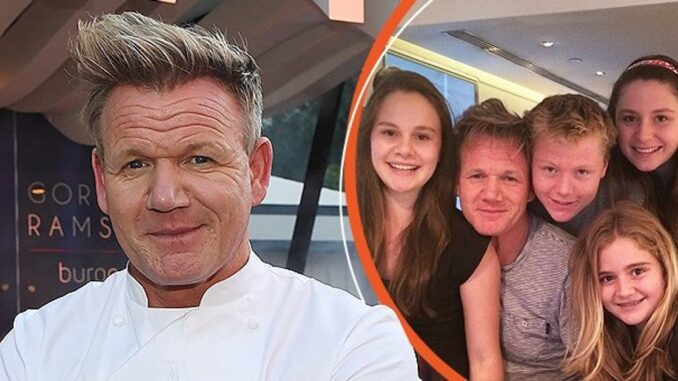
Gordon Ramsay has built an empire that extends far beyond the walls of his Michelin-starred kitchens. With successful restaurants spanning the globe, hit television shows like Hell’s Kitchen and MasterChef, and countless business ventures, the celebrity chef’s fortune is estimated in the hundreds of millions. Yet, despite his extraordinary wealth, Ramsay has made a surprising and somewhat controversial choice: his five children won’t inherit a penny of it.
Instead, Ramsay believes in instilling independence, hard work, and resilience in his kids—a philosophy that he feels money could undermine. For many, the decision raises eyebrows. Why would one of the world’s richest chefs deny his children the financial safety net his fortune could provide? The answer lies in Ramsay’s values, his upbringing, and his uncompromising outlook on life.
A Childhood That Shaped Him
Gordon Ramsay did not grow up surrounded by wealth or privilege. Born in Scotland and raised in England, he experienced a turbulent childhood marked by financial instability and personal struggles at home. For Ramsay, his journey to success was paved by discipline, perseverance, and relentless determination. He trained under some of the toughest chefs in the world, endured failures, and built his brand from the ground up.
That grit, he insists, is what made him who he is today. And it’s exactly what he wants for his children—Matilda (Tilly), Jack, Holly, Megan, and Oscar. According to Ramsay, leaving them a fortune would rob them of the hunger and drive that fueled his own success.
The Philosophy Behind the Decision
Ramsay has been blunt about his stance: “It’s definitely not going to them, and that’s not in a mean way; it’s to not spoil them.” He and his wife, Tana, have instead chosen to raise their children with as much normalcy as possible despite their global fame.
For example, when the Ramsays fly first class, their children sit in economy. Ramsay once explained: “They haven’t worked anywhere near hard enough to afford that.” This deliberate choice highlights his belief in teaching humility and financial responsibility, rather than offering luxuries simply because he can.
In his view, inherited wealth often creates entitlement. Ramsay fears that if his children were guaranteed millions, they might lack motivation to carve out their own paths. By withholding his fortune, he hopes to encourage them to build their own careers, develop resilience, and understand the value of money.
Support Without Handouts
While Ramsay has no intention of leaving behind his wealth as an inheritance, that doesn’t mean he won’t support his children. He has been open about helping with education costs, guidance, and opportunities. His daughter, Tilly, for example, has already made a name for herself in the culinary and entertainment industries, starring in Matilda and the Ramsay Bunch and competing on Strictly Come Dancing.
Ramsay emphasizes that he’s there to mentor and support, but not to hand over money. “The only thing I’ve agreed with Tana is they get a 25% deposit on a flat, but not the whole flat,” he once revealed. It’s about balance—providing enough to help them get started, but not so much that they avoid the hard work required to succeed.
Public Reaction to His Decision
Ramsay’s philosophy has sparked debate. Some admire his approach, praising him for teaching values in an age where celebrity children are often accused of entitlement. Others, however, criticize the stance, suggesting it may be unnecessarily harsh given the scale of his wealth.
But Ramsay has never been one to bend to public opinion. Just as he runs his kitchens with uncompromising standards, he applies the same rules to his parenting. For him, the ultimate gift he can give his children isn’t money—it’s the drive to succeed without it.
A Lesson Beyond the Ramsay Household
At its core, Gordon Ramsay’s decision highlights a universal question about wealth and parenting: should children inherit success, or should they earn it? While most families aren’t managing multimillion-dollar fortunes, the principle resonates. Parents everywhere grapple with how much to give, when to hold back, and how to ensure their children grow up with resilience rather than dependency.
Ramsay’s choice is extreme compared to many, but it underscores his belief in self-made success. He is a living example that determination, grit, and passion can overcome humble beginnings. And he wants his children to experience the same satisfaction of building their futures from scratch. At first glance, it might seem shocking that Gordon Ramsay—one of the richest chefs in the world—won’t leave his fortune to his children. But when seen through the lens of his values, it makes sense. For Ramsay, money is not the ultimate gift. Discipline, independence, and the ability to thrive under pressure are far more valuable than any bank account.
His kids may not inherit his millions, but they are inheriting something arguably more powerful: the tools to forge their own identities, stand on their own feet, and achieve success in their own right. In Ramsay’s eyes, that is the true legacy he leaves behind.
